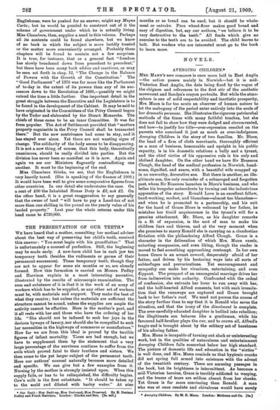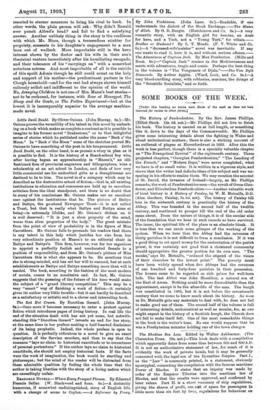NOVELS.
AVENGING CHILDREN.* MRS. MANN'S new romance is once more laid in East Anglia —the action passes mainly in Norwich—but it is mid- Victorian East Anglia, the date being fixed by the vogue of the chignon and references to the first stir of the aesthetic movement and Sandys's crayon portraits. But while the atmo- sphere is one of solid respectability and inartistic prosperity, Mrs. Mann is far too acute an observer of human nature to let the mahogany of the period enter entirely into the souls of her dramatis personae. She illustrates the rigorous patriarchal methods of the times with many faithful touches, but she does not fail to show how they were dodged and circumvented, and how—to justify her title—over-repression recoiled on the parents who exercised it just as much as over-indulgence. Avenging Children is the story of two families. Mr. Blore, the head of a firm of cloth merchants, thoroughly efficient as a man of business, honourable and upright in his public capacity, is in his domestic relations a bully and a tyrant, and the chief victim of his oppressive rule is his only and idolised daughter. On the other hand we have Sir Erasmus Clough, the head of the medical profession in Norwich, hand- some, dignified, and suave, with ,a beautiful wife wrapped up in an unworthy, decorative son. But there is another, an ille- gitimate son, the only reminder of a submerged and forgotten past, whom Sir Erasmus launches in Blore's business, and who belies his irregular antecedents by turning out the industrious apprentice of the story. Ronald Love is an excellent fellow, bard-working, modest, and blameless—almost too blameless— and when be is promoted to a partnership, and his suit for the band of Grace Blore is welcomed by her father, he mistakes her timid acquiescence in the tyrant's will for a genuine attachment. Mr. Blore, as his daughter remarks in a fit of expansion, is the sort of man to make his children Hari and thieves, and at the very moment when she promises to marry Ronald she is carrying on a clandestine flirtation with the philandering Alfred Clough. Grace is a character in the delineation of which Mrs. Mann excels, extorting compassion, and even liking, though the reader is moved to feel something approaching contempt. In her own home Grace is an arrant coward, desperately afraid of her father, and driven by his hectoring ways into all sorts of subterfuges and prevarications. Yet encouragement and sympathy can make her vivacious, entertaining, and even flippant. The prospect of an uncongenial marriage drives her from indiscretion into audacity. Confronted with the ordeal of confession, she entreats her lover to run away with her, and the half-hearted Alfred consents, but with such irresolu- tion that the runaways are captured and Grace brought back to her father's roof. We need not pursue the course of the story further than to say that it is Ronald who saves the situation, and that the irony of the denoilment is complete. The over-carefully educated daughter is bullied into rebellion; the illegitimate son behaves like a gentleman, while his favoured half-brother plays the cur, and to crown all, Alfred's tragic end is brought about by the solitary act of harshness of his adoring father.
Mrs. Mann is incapable of turning out slack or uninteresting work, but in the qualities of naturalness and entertainment Avenging Children falls somewhat below her high standard. The picture of domestic life and education in the "sixties" is well done, and Mrs. Mann reminds us that hygienic cranks did not spring full armed into existence with the advent of the twentieth century. There are amusing passages in the book, but its brightness is intermittent. As becomes a mid-Victorian heroine, Grace is terribly addicted to weeping, and the traces of tears are seldom absent from her cheeks. Yet Grace is far more convincing than Ronald. A man who was at once resolute and chivalrous would have surely
• Avenging Children. By IL E. Mann. London: Methuen and Co. res.] resorted to sterner measures to bring his rival to book. In other words, the plain person will ask : Why didn't Ronald ever punch Alfred's head ? and fail to find a satisfying answer. Another unlikely thing in the story is the readiness with which 'Mr. Blore, though a tremendous stickler for propriety, consents to hie daughter's engagement to a man born out of wedlock. More improbable still is the keen interest shown by the doctor and his wife in their son's theatrical venture immediately after his humiliating escapade, and their tolerance of his "carryings on" with a somewhat notorious actress. And most improbable of all is the suicide of this spoilt Adonis though he still could count on the help and support of his mother—the predominant partner in the Clough household—and for the rest had always shown himself callously selfish and indifferent to the opinion of the world. No, Avenging Children is not one of Mrs. Mann's best stories— not to be reckoned, for instance, with Rose at Hone ypot, The Sheep and the Goats, or The Patten Experiment—but at the lowest it is incomparably superior to the average machine- made noveL







































 Previous page
Previous page